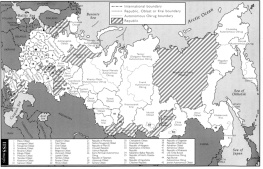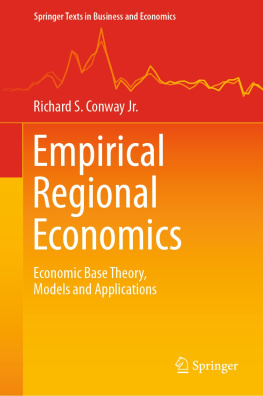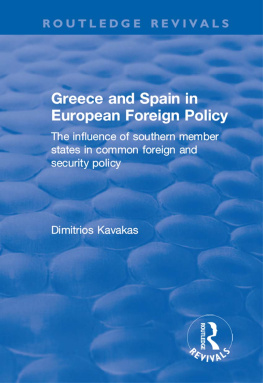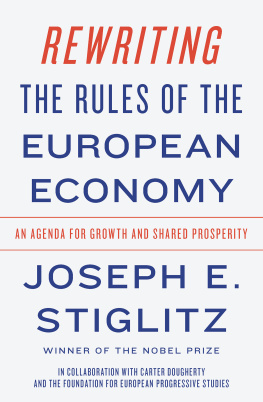REGIONAL BEHAVIOUR
Dedicated to my parents Christos and Sofianna
Regional Behaviour
Political values and economic growth in European regions
DIMITRIOS C. CHRISTOPOULOS
University of the West of England, Bristol, UK
First published 2001 by Ashgate Publishing
Reissued 2018 by Routledge
2 Park Square, Milton Park, Abingdon, Oxon OX14 4RN
711 Third Avenue, New York, NY 10017, USA
Routledge is an imprint of the Taylor & Francis Group, an informa business
Copyright Dimitrios C. Christopoulos 2001
All rights reserved. No part of this book may be reprinted or reproduced or utilised in any form or by any electronic, mechanical, or other means, now known or hereafter invented, including photocopying and recording, or in any information storage or retrieval system, without permission in writing from the publishers.
Notice:
Product or corporate names may be trademarks or registered trademarks, and are used only for identification and explanation without intent to infringe.
Publishers Note
The publisher has gone to great lengths to ensure the quality of this reprint but points out that some imperfections in the original copies may be apparent.
Disclaimer
The publisher has made every effort to trace copyright holders and welcomes correspondence from those they have been unable to contact.
A Library of Congress record exists under LC control number: 00134841
ISBN 13: 978-1-138-72162-3 (hbk)
ISBN 13: 978-1-315-19431-8 (ebk)
Contents
I have been fascinated by the emergence of politics of identity on the European political landscape. I thought it would be exciting to explore whether the agents of change, typically political and business elites, are somehow affected by issues of identity. Is interaction between elite groups affected by their sense of identity and does interaction between elite groups in itself affect regional growth prospects?
In the framework of the European Union a number of policies have been devised for regions in order to facilitate their balanced economic development. An attempt to coordinate these policies can be linked to the fact that European regions are increasingly interdependent as integration takes root and European Union policies become increasingly more relevant to this interaction. I believe that the importance placed by the academic literature and by the European Commission on regional planners and their actions has to an extent obscured the importance of regional elites in this process. This volume attempts to redress the balance, and does so by means of a series of interviews with business and political elites on the effects and prospects of further economic integration as well as administrative and political autonomy.
I am comparing Western Scotland and the west of Crete focusing on the wider regional political and business elites within these regions. My assumption that the interaction of regional elites with each other can be, at least partly, responsible for competitiveness differentials between regions underlies most of this analysis. I attempt a comparison of elite attitudes within regions and between regions. Particular attention is placed on the effect their aspirations to autonomy have on their interaction. I have been able to discern and identify a relationship between regional elite attitudes on devolution and their perceptions of business prospects in a region. I have also identified a relationship between the attitudinal concordance among a regions elite groups and regional growth prospects. Furthermore, I have identified certain value groups for which attitudinal concordance appears significant to elite cooperation. Ensuing conclusions do not necessarily have predictive value but, by identifying attitudinal patterns among regional elites, can provide an insight into the transforming effect of European integration and modernity on European regional civil societies.
The learning process inherent in this research exercise has been extremely positive as it has led me to ever more refined, intricate and dare I say exciting investigations. This volume, as the product of a research and scholarly exercise that spans a decade (1988-98), I have to qualify with the acknowledgement of my accomplishment being at best modest. Awareness of the limitations, weakness and applicability restrictions of this research make for the frequent references to validity. The measure of my limited accomplishment does not reflect however on the incredible support I have received from my family, academic advisors, colleagues and friends.
I am also grateful to the John Latsis Group for providing me with generous financial assistance between 1989 and 1991.
Academically I have to primarily acknowledge the assistance of the supervisor to my PhD dissertation Paul Heywood. He copiously and consistently provided me with support that extended well beyond the call of duty. I would not have finished this thesis without his assistance. Almost all of the academic and administrative staff at the Department of Politics in the University of Glasgow have at some point provided me with encouragement and support. I owe a particular debt of gratitude to Stephen White for consistent academic and personal support and for providing me with an example of academic excellence to follow in my academic future. Bill Miller has also been instrumental for my academic development assisting on a number of problems of methodology and providing me with a great number of refined insights on research approaches. James Kellas has frequently offered insights in to the Scottish political system and copiously proofread early drafts. John Peterson, Chris Berry and Michael Lessnof have also been a source of constant inspiration. They have been very approachable and their suggestions I have valued greatly.
I wish to also thank and acknowledge editorial and personal support from Stephen Herbert who was kind enough to review most of this volume always making valuable suggestions, he has been the most instrumental and effective reviewer of my work. Linda Blanshay, Ricardo Gomez, Clare McManus and Ian Murray have also provided me with very helpful comments on sections of this volume. Comments and suggestions during a number of conference papers proved very valuable and I would like to acknowledge comments by Charlie Jeffery, Michael Keating, Shari Garmise, Peter John, Elizabeth Bomberg, Hans van den Berg, Paul Heywood, Kleomenis Koutsoukis, Donatella DellaPorta, Martin Rhodes and Martin Bull. Also significant support I have received from Peter Lynch, Mark McAteer, Dimitrios Konstadakopulos and Geoffrey Pridham.
A great number of friends in Glasgow provided me with invaluable personal support and insights into Scottish custom and tradition. I have to specifically mention George and Jane MacMillan of MacMillan, Christopher Vine, Russel Clark-Jones, Paul Hampton, Ursilla Brown, Patricia Craig, Nadine Carmichael and Clare McAllister.
During the same period a great number of family and friends provided me with personal support. Ioanna and Vassilis Nicolaidis, John, Joseph and Edward McNelis as well as Panagiotis Pollalis, Giorgos Giannis, Nicos Giannis, Vali Lerouni, Spiros Plaskovitis, Katerina Zafiropoulou and Eleni Liakoura.
I would also like to thank all the participants in my survey for trusting me and sharing with me their opinions and perspective on a great number of potentially sensitive issues. A great number of senior local government and EC administrators, business executives and academics in personal interaction/interviews helped me orient the survey to the questions that mattered.











